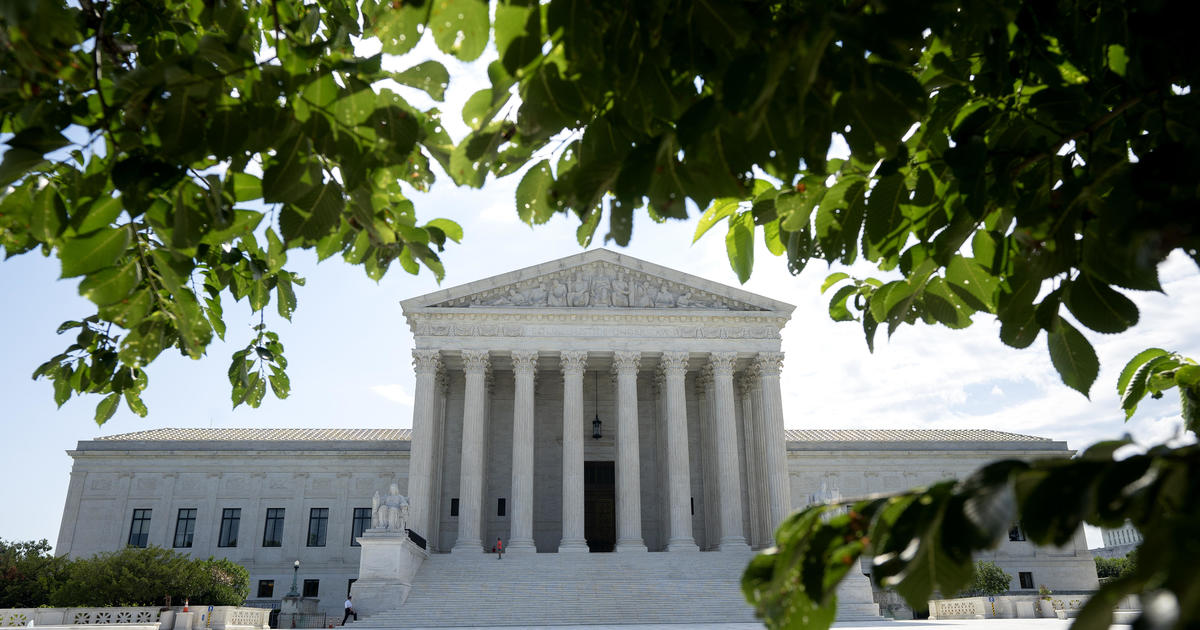Washington — The Supreme Court on Friday declined to let the Biden administration enforce portions of a new rule that includes protections from discrimination for transgender students under Title IX while legal proceedings continue.
The high court left intact two separate orders from federal courts in Kentucky and Louisiana, which blocked the Department of Education from enforcing the entirety of the rule across 10 states. The Justice Department had asked the Supreme Court to put part of the decisions on hold, but it declined the requests.
Four of the nine justices would have let part of the rules take effect, according to the order, but all members of the court agreed that the key disputed changes, including the new definition of “sex discrimination” to include “gender identity” and the restrictions on same-sex spaces, could remain blocked.
The measure at issue in the disputes was announced by the Biden administration in April and expanded Title IX’s protections to LGBTQ students. The landmark 50-year-old law prohibits education entities that receive federal funds from discriminating on the basis of sex. The rule took effect Aug. 1, but only in less than half of the states. Federal judges have temporarily blocked it in 26 states as a result of legal challenges.
The court fights before the Supreme Court involved two groups of states that challenged three provisions of the rule: The first recognizes that Title IX’s prohibition on sex discrimination covers gender identity; the second broadens the definition of “hostile-environment harassment” to include harassment based on gender identity; and the third clarifies that a school violates Title IX when it prohibits transgender students from using restrooms and other facilities consistent with their gender identity.
One case was brought by four states, Louisiana, Mississippi, Montana, and Idaho, as well as the Louisiana Department of Education. The second was filed by six states, Tennessee, Kentucky, Ohio, Indiana, Virginia, and West Virginia.
In June, federal district courts in Louisiana and Kentucky found the states were likely to succeed in their cases and blocked enforcement of the entire rule across the 10 states involved in the litigation. The Biden administration asked federal appeals courts in both cases to allow it to temporarily enforce part of the rule — the provisions that were not challenged — but each declined the requests in divided decisions.
In seeking emergency relief from the Supreme Court, the Justice Department argued that the district court’s injunctions are “grossly overbroad” because they block “dozens” of the rule’s provisions that weren’t challenged by the states, and that the lower court therefore did not find were likely unlawful.
“The district court’s injunction would block the department from implementing dozens of provisions of an important rule effectuating Title IX, a vital civil rights law protecting millions of students against sex discrimination,” Solicitor General Elizabeth Prelogar wrote in both requests.
She said the April 2024 rule is an “omnibus” measure, and most of it does not address gender identity. Instead, its provisions include clarifications to definitions of more than a dozen terms, including “complaint,” “elementary school” and “postsecondary institution.”
While acknowledging the challenges to federal regulations before they’re enforced are common, she accused lower courts of taking a “blunderbuss approach” to preliminary relief in these cases.
“The harm is particularly acute here because Title IX is one of the core federal civil rights statutes that guarantees nondiscrimination in the nation’s education system,” Prelogar wrote. “If the court does not grant the requested stay, the department will be unable to vindicate the critical protections of that statute in a wide swath of the country.”
But in the challenge from Louisiana involving the four states, Republican officials told the Supreme Court in a filing that the Biden administration’s rule would “radically impact” schools, teachers and families.
They claimed the Education Department took Title IX and its “promise of equal educational opportunities for both sexes and transformed it into a 423-page mandate” that requires covered entities to allow male students in girls’ bathrooms, locker rooms and other facilities, and teachers and students to use a transgender individual’s preferred pronouns.
“The Department cannot seriously contest that a partial stay would sow widespread confusion. Teachers would only have days, at most, before school starts, to understand their obligations under the judicially blue-penciled rule,” the Republican attorneys general wrote. “And that uncertainty and harm would equally affect parents and students.”
They said there is uncertainty about how a practically blocked rule would operate, leaving parents unable to make decisions about whether to send their children to public school.
In a separate filing in the Kentucky case, officials from the six states accused the Biden administration of forcing schools to spend “immense sums” to comply with the new rule in just three months.
They warned the court not to “unleash eleventh-hour havoc — and needless diversion of valuable resources — on schools, students, and sovereign states.”
In addition to the Louisiana and Kentucky cases, a number of other challenges to the Biden administration’s Title IX rule are pending in the lower courts.
The Education Department’s Title IX overhaul comes amid a swell of laws enacted in Republican-led states in recent years that are aimed at transgender youth. More than 20 states restrict treatments like puberty-blocking drugs, hormone therapy or surgeries for minors experiencing gender dysphoria. The constitutionality of one of those laws, from Tennessee, will be reviewed by the Supreme Court in the fall.
At least 11 states have laws on the books that bar transgender people from using bathrooms and other facilities consistent with their gender identity in schools, and 25 states prohibit transgender girls from competing on their schools’ female sports teams.
contributed to this report.
